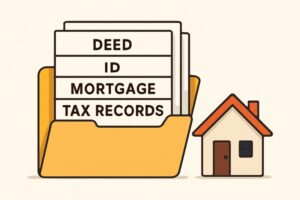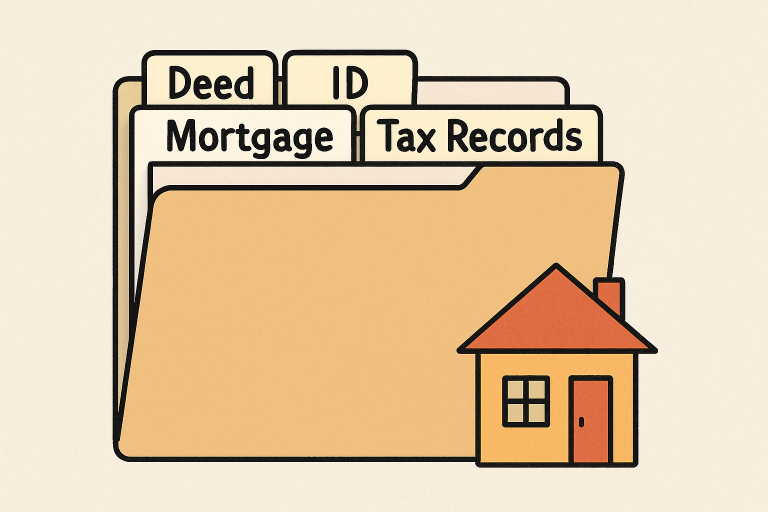Key Takeaways
- Gathering key documents before listing expedites your home sale and boosts buyer confidence.
- Inclusion of legal, financial, and property records streamlines the process and reduces the risk of delays.
- Prepping documentation not only displays organizational readiness but can also speed up negotiations and closing.
Preparation is crucial when aiming to sell your home quickly. The process goes far more smoothly if you have all the necessary paperwork in order from the start. Taking these steps not only saves you time but also gives buyers confidence in a well-managed transaction. For those seeking a quick sale without the hassle, we buy homes, which offers a direct, simple solution for homeowners.
Compiling a complete file of essential documents can prevent unnecessary delays once you find a buyer. Home sales often stall when paperwork isn’t readily available, causing stress for both buyers and sellers. By anticipating document needs and organizing ahead, you create a seamless experience that promotes trust and expedites negotiations.
The right documentation balances legal requirements, buyer requests, and peace of mind for all parties involved. While each transaction is unique, certain documents appear in virtually every home sale, whether the market is fast-paced or slow.

Proof of Ownership and Identity
Property Deed
The property deed is your primary proof of ownership and is non-negotiable in any real estate transaction. This legal document is necessary to confirm that you are the rightful owner and can transfer the title to the buyer. Not having it in order can cause significant delays.

Government-Issued ID
Secure and up-to-date identification is required at multiple stages. Valid government-issued ID, such as a driver’s license or passport, ensures that your identity is easily confirmed and prevents fraud during the transaction process.
Financial Documents
Mortgage Statement
A current mortgage statement outlines your loan balance and is crucial for determining payoff amounts. Buyers and their agents typically want to know how much of the proceeds will be used to settle the mortgage, and your lender will require this document to start the payoff process.
Property Tax Records
Up-to-date property tax records indicate you have fulfilled your obligations to the local government. Buyers want to avoid inheriting any outstanding debts, so current records reassure them that the taxes are settled. Having these documents ready not only builds trust but also helps you sell property fast by eliminating potential delays during due diligence. According to Kiplinger’s Real Estate Guide, this is among the most requested documents by homebuyers and their agents.
Property Information
Original Sales Contract
Having your original purchase agreement on hand clarifies things for both your real estate agent and prospective buyers. It often reveals terms, special use agreements, or warranties that might still be valid.
Homeowners Association (HOA) Documents
If your property falls within an HOA, you must share related documents. These outline the rules, regulations, fees, and assessments that govern the community and are useful for buyers making a long-term commitment.
Inspection and Maintenance Records
Pre-Sale Inspection Reports
A recent pre-sale inspection report comprehensively discloses your property’s condition. It allows buyers to trust the integrity of the sale and may eliminate the need for duplicate inspections, speeding up the due diligence period.
Repair and Maintenance Records
Organizing receipts and logs of repairs or maintenance offers transparency and can serve as substantiated proof of upkeep. They can help justify your asking price and reassure buyers of the home’s condition.
Legal and Compliance Documents
Mandatory Disclosures
Sellers must provide disclosure statements about issues such as prior damage, updates, or material facts affecting property value. In states like California, detailed transfer disclosure statements are mandated. Proper compliance with local law helps protect both parties from potential legal disputes.
Energy Performance Certificate (EPC)
In many regions, an EPC rates your home’s energy efficiency and is often required to list a property. Buyers are increasingly mindful of energy costs, making this certificate a strong selling point.
Appliance and System Documentation
Warranties and Manuals
Include all warranties and user manuals when providing high-ticket appliances or major home systems. Their presence adds confidence for buyers and reduces questions after the sale.
Additional Considerations
Comparative Market Analysis (CMA)
A CMA, typically prepared by your real estate agent, compares similar recent sales and current listings to help position your property competitively. Sellers can use this data to assess a realistic listing price, attracting motivated buyers early in the process.
Listing Agreement
If you engage an agent, the listing agreement formalizes your partnership and details commission, responsibilities, and other terms. This document sets expectations and prevents confusion as the sale progresses.
Final Thoughts
Proper documentation is the keystone to a stress-free, speedy home sale. From proof of ownership and identity to appliance warranties and disclosure forms, organizing reassures buyers and eliminates avoidable obstacles. Forward-thinking preparation not only increases your chances of closing quickly but also maximizes your negotiating power in a competitive market. Responsive sellers with complete paperwork are viewed as low-risk, motivating buyers to act fast.



